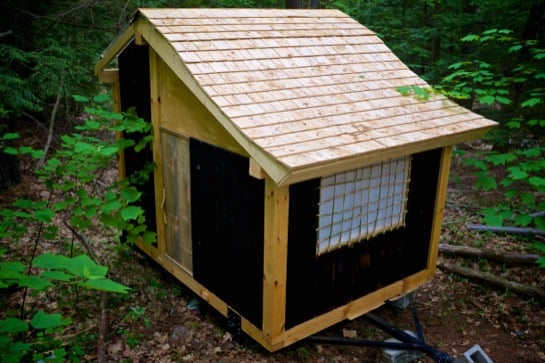Tiny Houses: Creating a Home Worth Living In
I built a tiny house to learn how to create a home worth living in. Growing up in one city – Lawrence, MA – and settling in another – Somerville – I had always been dependent on the structures and systems built for me, without understanding how they developed, what sustains them, or whether they’re life-giving or life-denying. Through the process of immersing myself in the construction of a new home and a new life, I’ve started to rediscover lessons that we’ve collectively forgotten. As we face an uncertain future for the planet, I hope to help others make life changes informed by both ancient and modern wisdom, rooted not only in the land but also in the limitations of our time.
Anybody can design their own home, and any able-bodied person can build it. Those privileged with the time and resources to do it, ought to. In today’s world, we are increasingly alienated from the basic skills our ancestors embodied. We have come to prefer specialization to such a degree that everybody must depend on an industrial system that does more harm than good. Any steps we can make toward creating a more human, organic, small-scale, sustainable system will ripple out and influence those around us to reconsider their own choices. When our living situations are neither healthy nor dignifying, something must change. Although we can all tap into a common sense that shows the way, sometimes we need a nudge in the right direction.

Bodhi Crumb, an emerging retreat center in Barre, intends to help people find a way back to a truly shared common sense. Part of Bodhi Crumb’s mission includes dreaming and building spaces for reconnection. The Floating Tea House is an intimate room where people can meet. Crawling through the small door creates the feeling of leaving the vast world and entering the interior world, which is in fact just as vast. By letting in filtered light, the space gently references the outside passage of time; by offering no clear view of the surroundings, the space redirects guests inward. The traditional Japanese tea ceremony has developed into an elaborate, hours-long ritual. While the Floating Tea House can host two or three guests for a traditional ceremony, its broader purpose is to help visitors slow down and reflect. Our culture has little reference point or appreciation for such sacred rituals; the challenge now is to find ways of introducing the transcendent and relevant rituals in ways that aren’t bewildering, exotic, sectarian, or touristic. Whether through art, reading, writing, therapy, or just meeting, the Floating Tea House opens the door to new encounters with each other and ourselves.
When I built my house, I felt motivated to make big changes in my life, to seek meaning and growth away from a life of slumber. Today, that motivation has turned into a responsibility toward other people who are seeking. We’re responsible for our home planet and its inhabitants, whether we choose to notice or not.

– – –
Written by Dave St. Germain of Bodhi Crumb
Meet the Dave and explore the Floating Tea House at the 2nd BIG Tiny House Festival on July 16, 2016 at The Umbrella Community Arts Center in Concord, MA.
– – –
